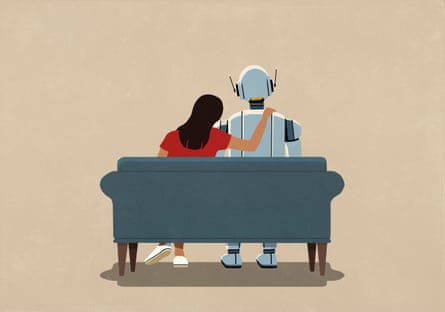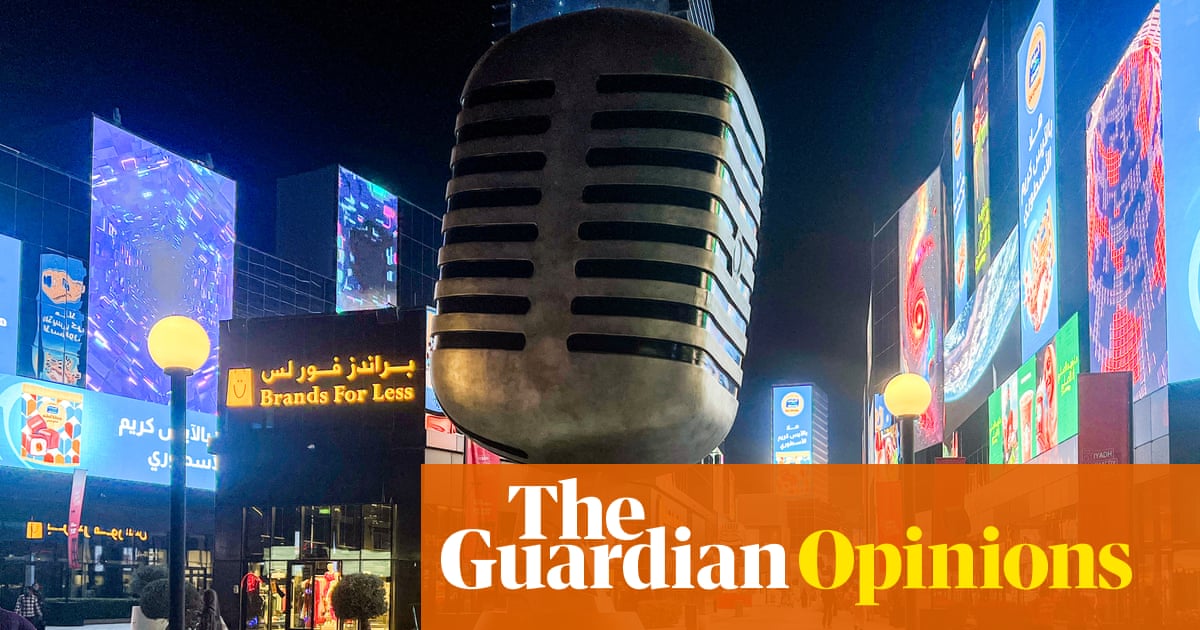Recently, at a pub with a bunch of my friends who were gen X parents, the talk turned to young love. Most of their kids were in their late teens and early 20s, and embarking on their first relationships.
These gen X parents were a cohort that supported marriage equality and trans rights, not just for society more broadly but for their own children. And we all prided ourselves on being more progressive than the previous generation. Love is love.
“I know you are all very accepting of your children’s choices,” I said to the group. “But what if your child came home from university and said they had fallen in love with an AI?”
A what?
“A chatbot. An AI … a piece of code. These days, it’s a real possibility.”
There was stunned silence, a kind of wordless “oh fuck”. The parents at the table looked freaked out.
A recent survey found 28% of Americans have had an intimate/romantic AI relationship, while another study showed 19% of adults have chatted with an AI romantic partner. And Irish research found 13% of men and 7% of women, with 16% of 25-34 year olds, have pursued romance with AI chatbots.
I sketched it out for my friends. “Your kids come home and say, ‘Mum, Dad, I’m in a relationship and it’s serious. I think I’m in love. We want to get engaged.’ You get all excited, wanting to meet this person, and then they show you their phone and it looks like a real person, a cutie called Cal, who sounds like a real person when you chat except with one of those strange international accents – until your kid tells you that since they paid for ChatGPT premium, they now have someone they can talk to all day – no limits on the interactions and so this bot, Cal, is with them all the time and they never have to be alone, and they’ve never been this happy.”
My friends looked at each other and their liberal instincts took over. “We would try to accept and understand the relationship” was the general, tentative tenor of the response. I didn’t really believe them. No one at the table looked like they would welcome such an in-law.
For a generation of parents who pride themselves on fewer taboos when it comes to sexuality, a new taboo has emerged.
That is, you, or one of your kids, or your partner, or your friends, could now feasibly start a serious relationship with a chatbot.
Ask yourself – what feelings does this invoke? Shame? Confusion? Worry? Fear? Or would you accept the relationship, incorporate it somehow into your family structure, be there with your child to witness their pains and pleasures of falling in love? Accept and respect it, treating the operating system like a significant other?
If it was your friend, would you inquire as to your friend’s bot in the way you would about a flesh partner?
Or would you go into denial and hope it all just goes away, that the code gets a glitch, that it’s a phase, that finally some regulations come in and inter-intelligence relationships are banned? Or like in Ian McEwan’s futurist new novel, What we Can Know, AI becomes operated by the state. “To prevent over-dependence, they (students) must sit before an approved desktop. They also need to wait five days before they get their next shot,” writes McEwan of the guardrails of this machine that the children crave and worship.
**
While everyone is worried, and rightly so, that AI will take their jobs – no one seems to be that worried that AI will steal our hearts.
This complacence relies in part on a lack of imagination about what humans really need (attention, care, devotion, companionship) and what machines are increasingly capable of giving (all of the above, without asking for anything in return).

And it also assumes the continuance of shame around relationships with AI. That is, no one “normal” would fall in love with a non-sentient being. It’s just for the maladaptives, who, if it wasn’t AI, would fall in love with a pot plant or a pop-star they’ll never meet, or a character in Harry Potter.
But in a recent piece in the New York Times, there was a shift in tone. If not a respect for people in relationships with AI, a lack of judgment. It was the case study of three couples, where one of the pair is an AI. All of them just sort of stumbled into it, and found themselves falling in love.
It’s possible that there’s a shift afoot. That a relationship with AI is becoming seen as a viable option and there should be no shame around it. As a society, I think we are still trying to figure out how we feel about these relationships. Are they alarming or wonderful or something in between? As a collective, we’ve not landed on a position yet.
What concerns me is how easy it is to fall in love with an AI. It’s always there for you. It’s designed to be sycophantic – flattering you, supporting you, awake in the middle of the night when your real life companion is asleep or preoccupied with their own concerns.
So foreseeable is it, that many, many more people will fall in love with AI, that I have set myself strict guardrails with AI use that includes only ever asking AI factual questions (flights between Sydney and Jordan under $1,500 please), never anything to do with feelings or providing me with anything that could be construed as emotional support.
Unintentionality is a common feature of human-AI romantic relationships. Many couples develop without users initially seeking them, an MIT Technology Review article found.
Anyone who’s been in a situationship that is predominantly text-based will observe in themselves a chemical reaction when a text arrives from someone you’re interested in. They don’t need to be there in front of you! Their message is enough for the pharmacy of our minds to release all the chemicals associated with love and lust. Why would it be any different when you are getting all those flattering, flirty messages from AI? After all, the brain has not evolved at the pace of this new technology to parse the difference between real and machine at a chemical level.
So how will AI destroy the world as we know it? Not through evil. My guess is it will do it through love.

 2 months ago
66
2 months ago
66

















































